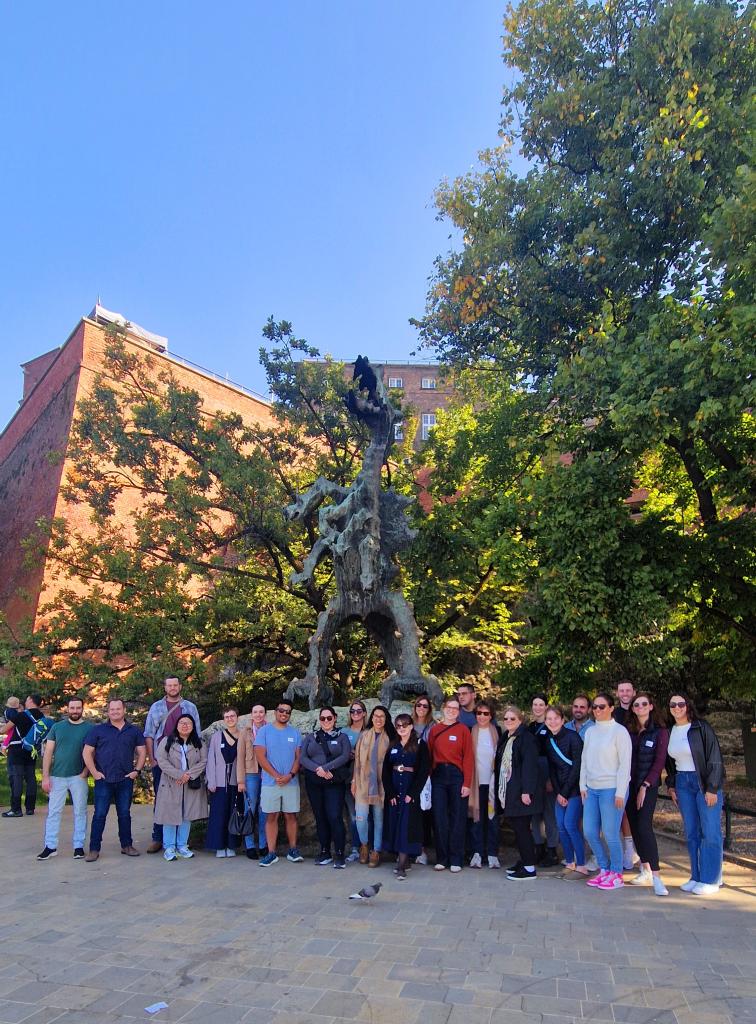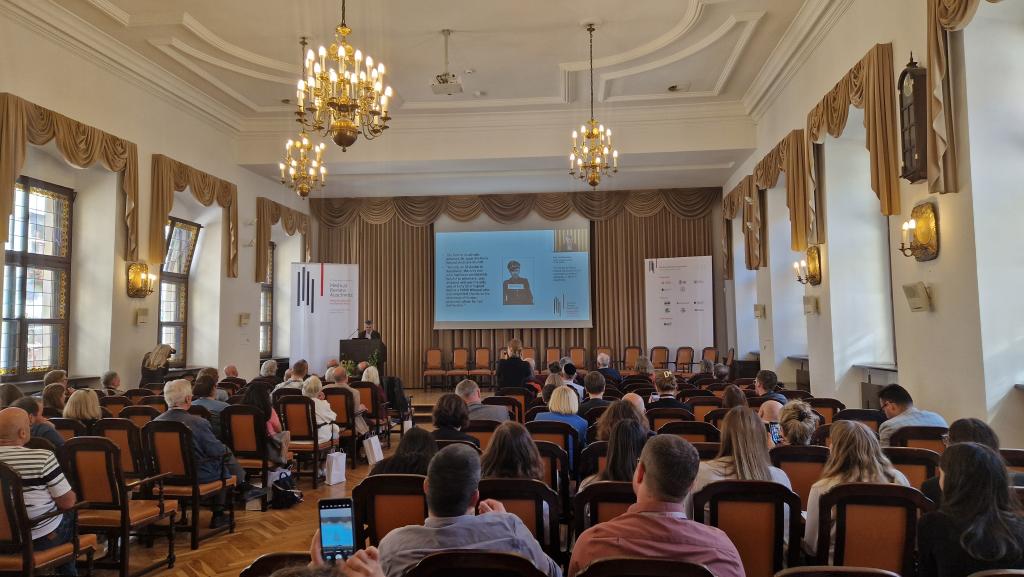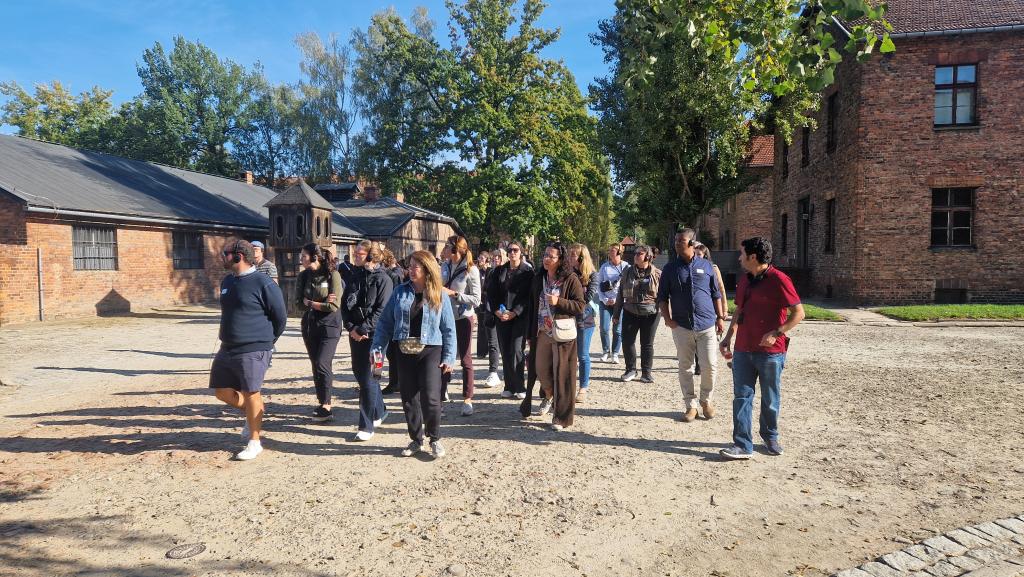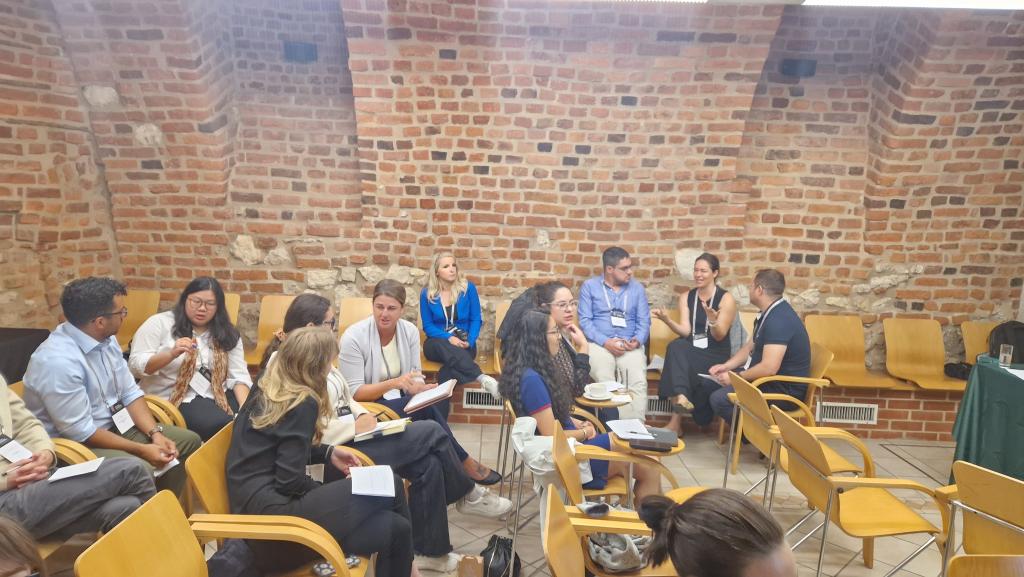In addition to the educational programming offered by Harvard Medical School Center for Bioethics, outside of formal coursework, recent students and alums have had the opportunity to immerse themselves in the historical context of bioethics by taking part in an annual immersive experience and conference in Poland. The Medical Review Auschwitz: Medicine Behind the Barbed Wire Conference provides a curriculum that integrates both ethical theory and its profound historical implications.
Dr. Rebecca Brendel, Director of the HMS Center for Bioethics, has made incredible strides with her programming to integrate bioethics into teaching the next generation of medical students and physicians through the annual trip to Oświęcim, Poland, an immersion into the historical involvement of physicians in the crimes of the Holocaust. When asked about what initially motivated the Center to pursue this effort, Dr. Brendel shared:
“It was a combination of personal interest and professional commitment that led me, and then our Center, to get involved. There's been a long history of bioethics thinking about medical involvement in the Holocaust. This journey began with a desire to learn about my own ethnic and cultural history. I had previously avoided traveling to sites of the Holocaust because I felt unease about visiting as a tourist. Doing so with colleagues and students in a way that allowed me to contribute personally and professionally in a way that would honor the past and contribute to the future was an opportunity I immediately acted on.”

A psychiatrist by training, Dr. Brendel was visiting Nuremberg, Germany, for a conference in 2016 when she connected with a colleague, Dr. Joel Dimsdale, over his new book, Anatomy of Malice: The Enigma of the Nazi War Criminals, which analyzes the psychology of Nazi leaders. One of the conference's most poignant moments was Dr. Dimsdale’s keynote presentation, delivered in the very courtroom where the historic Nuremberg Trials had taken place. Sitting in that room, where justice was once sought for the horrors of the Holocaust, Dr. Brendel was struck by the profound power of experiencing history in the place where it unfolded:
“Being there and experiencing the space, learning about the history of what happened, and bearing witness is extraordinarily powerful.”
This experience further fueled her mission to ensure that the lessons of the past inform the ethical responsibilities of medical professionals today. In the process, Dr. Brendel met Piotr Gajewski, an internist dedicated to translating Medical Review Auschwitz from Polish into English. His goal was to make critical information about the medical crimes of Nazi doctors more accessible to international audiences, shedding light on the Nazi medical experimentation program conducted during the Holocaust. Their shared commitment to preserving and disseminating this knowledge led to further collaboration, as Dr. Brendel was then invited as a panelist at the second-annual Medical Review Auschwitz International Conference, an event designed to examine the historical and ethical lessons. This conference, bringing together bioethics-driven physicians and scholars from across the globe, sought to provide education about some of medicine’s and humanity’s darkest moments to that they are never repeated. From this gathering, a collaboration formed between bioethics-inspired physicians looking to educate the doctors of tomorrow.
Together with Dr. Matthew Wynia, Director of the Center for Bioethics and Humanities at the University of Colorado Anschutz Medical Campus and Dr. Tessa Chelouche, Co-Director of the Maimonides Institute for Medicine, Ethics and the Holocaust, and the Co-Chair of the Department of Bioethics and the Holocaust of the International Chair of Bioethics, the Center offered students a scholarship opportunity to attend the Medical Review Auschwitz: Medicine Behind the Barbed Wire Conference. Participants were provided a unique opportunity to visit medical areas of concentration camps not usually accessible to tourists, where they could thoughtfully discuss the historical reality of physicians' roles in the Holocaust and its relevance to modern-day ethical issues with international experts. The students began the four-day trip by learning the historical context of Poland at the time, including a walking tour of Kraków to discuss the political and ethical complexities of that era.
“The educational goals of this immersion are both didactic and experiential. They come together to let us look at the history and the future." -Dr. Rebecca Brendel, Director of the Center for Bioethics

When discussing the curriculum and learning outcomes of this effort, Dr. Brendel directed attention to the role of Nazi doctors and the “language of patriotism and the state” that led them to justify their actions. She noted the importance of awareness that medical professionals can fall into similar justifications under different circumstances, further reinforcing the importance of ethical vigilance in everyday practice, even within her own work. “Anyone who thinks about ethics in absolutes and says that they would never do something, doesn’t understand that no matter how good we strive to be, we, as humans, are incredibly susceptible to the influence of our environments” she explained.
The students have shared the emotional and intellectual impact from their time on the trip, with their approach to bioethics and medical practice being further shaped from their interactions with other healthcare professionals on the same learning journey. One of the young Israeli physicians on the trip, Moran Ezri, a granddaughter of the youngest twin subjected to the experiments of Dr. Joseph Mengele, known as “the angel of death,” shared her family story of the horrific medical torture her grandfather endured when he was separated from his family at the age of 4. Dr. Brendel observed, “Observing Moran’s strength in telling her family story and her commitment to medicine and healing is so powerful.”

Students were also able to share their experiences with the group, as Gali Katznelson, MBE a graduate of the Center, described,
“Reflecting as a group helped me put labels to the difficult emotions that I felt as I tried to make sense of physician contributions to the Holocaust… Prior to this trip, I did not grasp to what degree the profession of medicine, and in particular psychiatry, contributed to the Holocaust.”
Ardita Pramudani, MD was another exemplary student who attended the trip shortly after graduating from the Masters of Science in Bioethics. When asked about her takeaways from the trip, she described:
“This experience reshaped my understanding of medicine itself. Medicine is not isolated—it is deeply influenced by social, political, and ethical forces shaping human lives. The conference was a stark reminder of what happens when science advances without ethical grounding. As someone working in bioethics and rare genetic diseases, this reinforced the need for vigorous checks and balances in medical research and innovation, particularly in protecting vulnerable populations from exploitation.”

The Center for Bioethics has always placed emphasis on teaching medical leaders of tomorrow how to navigate a world of bioethical complexity. Dr. Brendel’s work to teach the physicians of tomorrow how past compromises in medical ethics have escalated into devastating outcomes continues today, and every day, in the field of medicine. “In this era of being pressured in medicine—never having enough time, productivity demands—it can make us less empathic.” Dr. Brendel continued, “It starts with but is not just about creating environments that foster care. We need to think about what it looks like to promote human dignity in every aspect of our society as we educate physicians and other health care practitioners of tomorrow.”
The next Medical Review Auschwitz conference is scheduled for September 15-17, 2025. The program is open to all interested Harvard-affiliated participants; advance registration is required.